Unit 1 Past and Present(I)课件牛津译林版八年级英语下册(共69张PPT)
文档属性
| 名称 | Unit 1 Past and Present(I)课件牛津译林版八年级英语下册(共69张PPT) |  | |
| 格式 | pptx | ||
| 文件大小 | 6.0MB | ||
| 资源类型 | 教案 | ||
| 版本资源 | 牛津译林版 | ||
| 科目 | 英语 | ||
| 更新时间 | 2022-05-04 11:15:17 | ||
图片预览


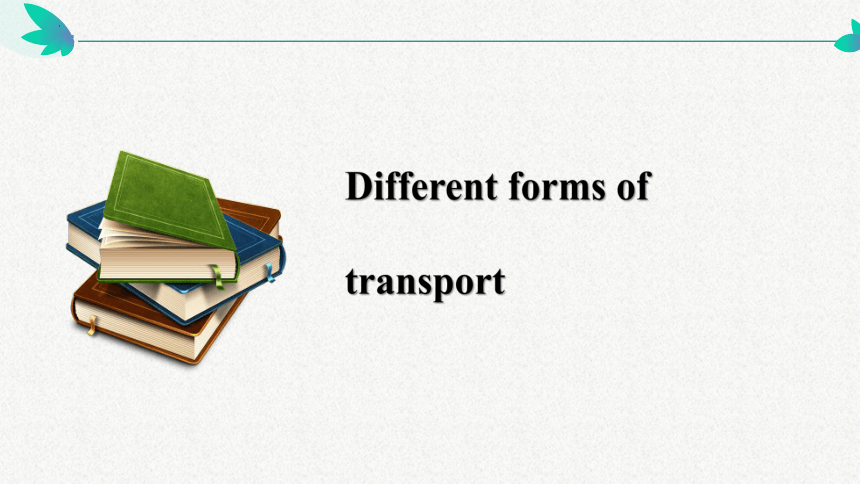
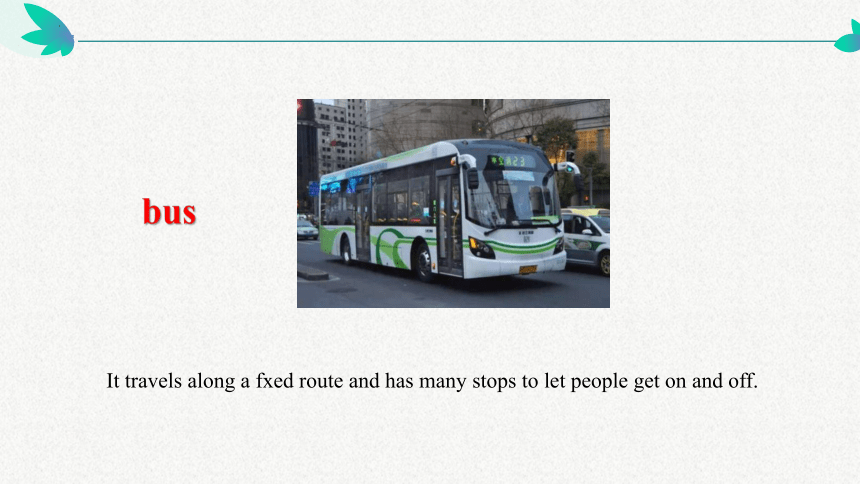
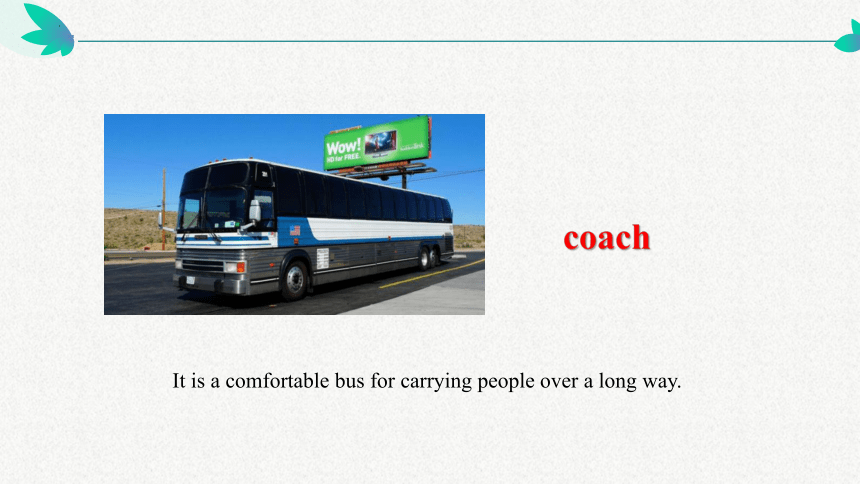
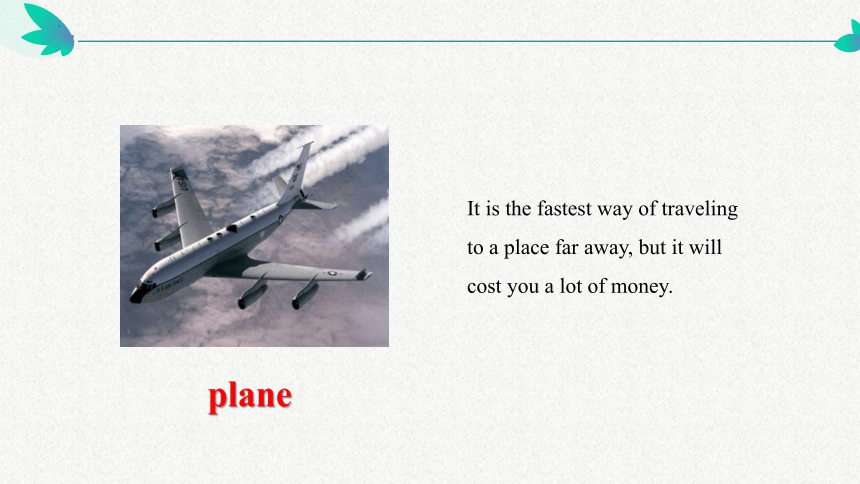

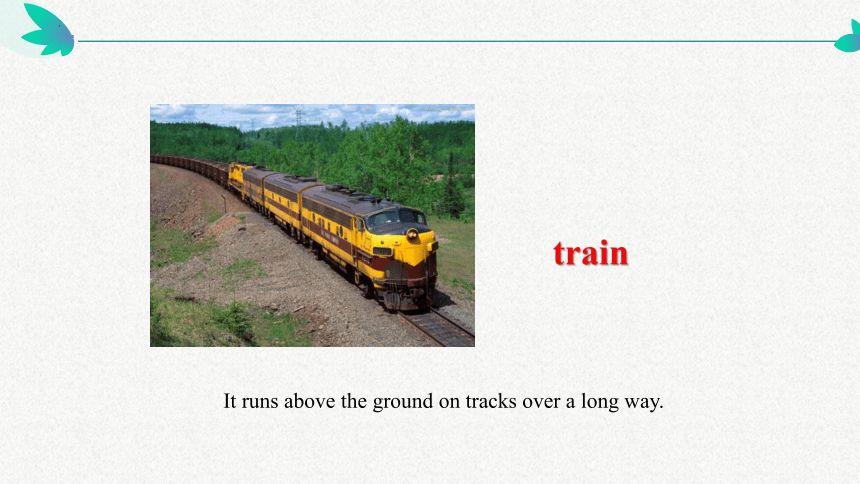
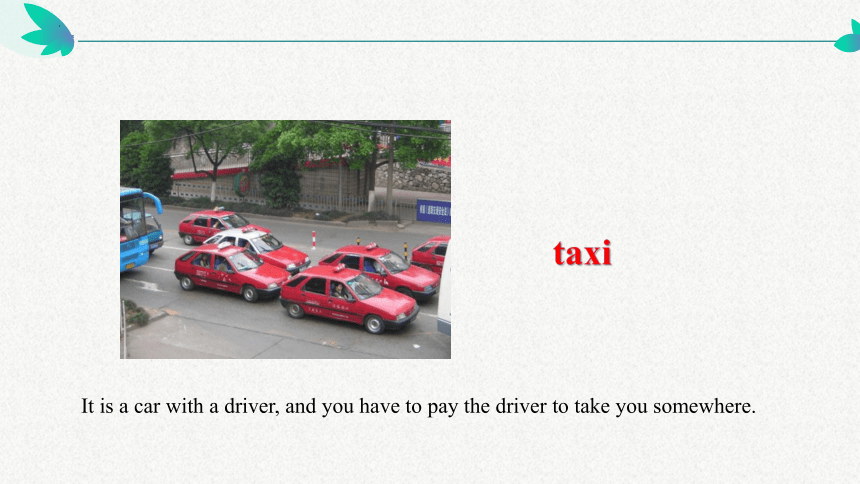
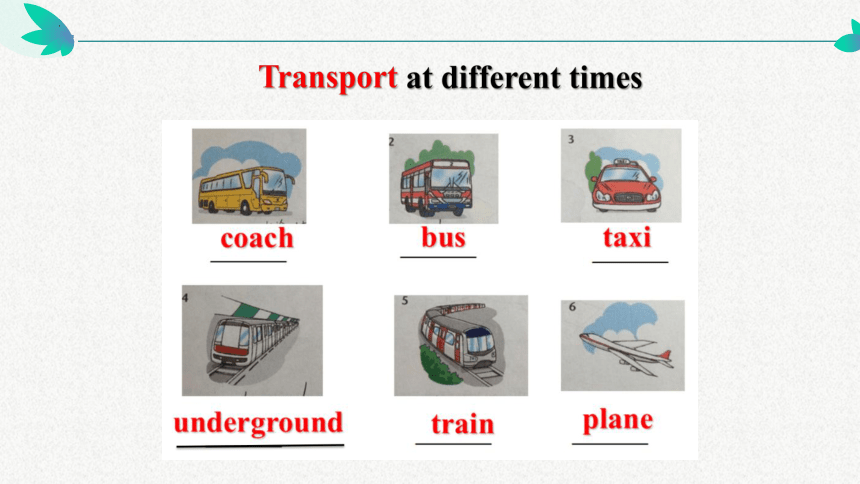
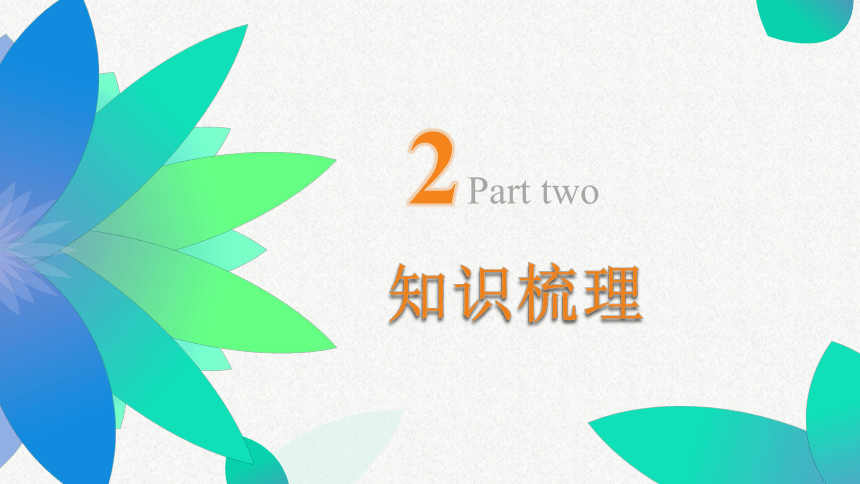

文档简介
(共69张PPT)
Past and Present(I)
Unit 1
1
课堂导入
Part one
Different forms of transport
It travels along a fxed route and has many stops to let people get on and off.
bus
It is a comfortable bus for carrying people over a long way.
coach
plane
It is the fastest way of traveling to a place far away, but it will cost you a lot of money.
underground
Thousands of people go to work on it every day. It is fast and it is under the ground.
train
It runs above the ground on tracks over a long way.
taxi
It is a car with a driver, and you have to pay the driver to take you somewhere.
Transport at different times
2
知识梳理
Part two
Welcome to the unit
Part 1
Section A. Comic strip
1、past and present
1) past
n. 过去,以前; in the past "在过去"
adj. 过去的,以前的; in the past few years 在过去的几年里
prep. 经过 walk past the post office 走过邮局
2) present
adj. 现在的;目前的;出席的
n. 现在;礼物 at present 现在
a present for you 给你的礼物
2、I've just eaten it.
just作副词,表示"刚刚",通常与现在完成时连用。
just now意为"刚才"相当于amoment ago,通常和一般过去时连用。
例如∶I have just heard the news.
He left just now.
3、You used to share food with me.
1) used to do sth."过去常常做某事",暗含"现在不再"之意,后接动词原形,疑问形式可以直接将used提到句首,或者借助助动词did;否定式可以直接在used后面加not,或者用didn't。
used to do sth. "过去常常做某事" 例如∶I used to go to school by bus.
be/get used to doing sth. "习惯于做某事" 例如∶I am used to living here now.
be used to do/for sth. "被用来做某事" 例如∶A pencil is used for writing.
2) share 及物动词,意为"共享,共用",常用结构为share sth.with sb."与某人共享某物"。
例如∶ He shares a room with his twin brother.
4、You used to be so kind to me.
kind“有好的,友善的”,be kind to“对.....友好”。
例如: We should be kind to others.
Section B.Welcome to the unit
Mille: How did you go to school when you were a student, Dad
Dad: I used to go to school by bike.
Millie: Why didn't you take a bus
Dad∶Well, there were always too many people on the bus, and it took a long time to wait for the next one.
Millie: Really I go to school by bus. Now it's easy and fast.
1、Why didn't you take a bus
take+a/the+表示交通工具的名词,在句中作谓语。
by+表示交通工具的名词,或者介词in/on+表示交通工具的名词,在句中作状语。
例如∶He takes a bus to school. = He goes to school by bus.
2、Well, there were always too mamy people on the bus and it took a long time to wait for the next one.
1) too many意为"太多",修饰可数名词复数。例如∶There are too many books in the box.
too much同样表示"太多",修饰不可数名词。例如∶I have too much homework to do today.
much too意为"太",用来修饰形容词和副词,表示程度。例如∶It's much too hot today.
2) take可用来表示"花费",常用结构为"It takes/took(sb.)some time to do sth."意为"花费(某人)多长时间做某事",it是形式主语,真正的主语是后面的动词不定式。
例如∶ It took me three hours to finish the housework.
3) wait for sb./sth."等待某人/某物",wait to do sth."等待做某事",can't wait to do sth."迫不及待做某事"。
例如∶ They are waiting for the bus.
The children can't wait to open the present box.
Reading
Part 2
block n.街区
northern adj.北方的
wife n.(pl.wives)妻子
husband n.丈夫
waste n.废料;废品
pollution n.污染;污染物
factory n.工厂
lonely adj.孤独的
Millie: Do you know Sunshine Town very well, Mr Chen
Mr Chen: Sure. I've lived here since I was born.
Milie: Have you ever moved house
Mr Chen: Yes. I first lived in the northern part of town with my parents.When I got married in 1965,
my wife and I moved two blocks away and we've lived in this area since then.
Section C. Reading
Millie: Has the town changed a lot over the years
Mr Chen: Yes! We only had some small restaurants and shops years ago.And we had a post office and a
cinema in the town centre. Now the government has turned part of the town centre into a
new park. We have a new theatre and a large shopping mall too.
Section C. Reading
Millie: Was pollution a problem then
Mr Chen: Yes, it was. There was once a steel factory near the Sunshine River. They often put the waste into
the river. Later the government realized the problem and took action to improve the situation.
Now the river is much cleaner.
Millie: Do you think life is better now
Section C. Reading
Mr Chen: Well, in some ways it is. It's really nice to have a beautiful modern town. However, most
of my old friends have moved away. It has become impossible for us to see each other as
often as before. We used to play cards and Chinese chess together. Now I feel a bit lonely
from time to time. Anyway, it's good to see the amazing changes in the town.
Section C. Reading
1、...so Millie is interviewing him to get some information.
interview 作及物动词,表示"采访". 例如∶ interview sb."采访某人"
interview还可以作名词,表示"采访某人"时,后面加上介词with,
例如∶have an interview with sb."采访某人"
The interview with the famous writer is great.
2、I've lived here since I was born.
since作连词,表示"自………以来",引导时间状语从句时,从句用一般过去时,主句用现在完成时。
例如∶He has worked in this company since he graduated from college.
since也可以用作介词,后面加上表示过去的时间点,同样和现在完成时连用。
例如∶The family have lived here since three years ago.
结构 "It has been/is+时间段+since+一般过去时"表示"自从..….已经多长时间了"。
例如∶It has been/is five years since they got married.
3、Have you ever moved house
1) ever作副词,意为"曾经"。
例如∶---Have you ever thought of changing a job
--- No, never.
2) move可以表示"搬家,迁居",move to some place"搬往某地"。
例如∶They moved to Shanghai last year.
4、I first lived in the northern part of town with my parents.
① in the northern part of town=in the north of town"在城镇的北部",表示东西南北的方位名词加上"ern"构成形容词。
② 英语中表示两地位置关系时,in表示"在范围之内",on表示"两地接壤",to表示"两地相望,中间有间隔"。
B is in the east of A.
C is on the east of A.
C is to the east of B.
5、When I got married in 1965, my wife and I moved two blocks away and we've lived in this area since then.
1) get married"结婚"表示动作,be married表示状态,因此get married 不可以和一段时间状语连用,be married可以和一段时间状语连用。
例如∶ They have been married for ten years.
2) marry可以做及物动词,意为"嫁给某人,把.……嫁给….."。
例如∶ She married a rich man.
He married her daughter to a foreigner.
3) be/get married to sb."与某人结婚"
例如∶ Will you get married to him
6、Has the town changed a lot over the years
over the years意为"在这几年间",over这里作介词,表示"在….期间",相当于during。
例如∶ He has learned a lot in the company over the years.
7、Now the government has turned part of the town centre into a new park
turn..into"把…..变成.…..",turn into"变成"。
例如∶ Farmers turn wasteland into fields.
They want to turn the place into a new school.
turn的用法拓展
1) turn表示"转动、翻转"
例如∶Turn your body back.
2) turn作系动词,表示"变得",后面常接形容词作表语。
例如∶ Leaves turn yellow in autumn.
3) turn还可以作可数名词,意为"轮流,依次",take turns to do sth."轮流做某事"。
例如∶The students take turns to answer the teacher's questions.
8、There was once a steel factory near the Sunshine River.
once此处用作副词,意为"一度,曾经"。另外,once还可以表示"一次"。
例如∶ They once lived abroad.
He goes swimming once a week.
9、They often put the waste into the river.
1) put...into"把.…放进….."
例如∶ You shouldn't put so much salt into the dish.
put构成的相关短语
put up 张贴,举起 例如∶ The boy put up his hand and asked some questions.
Could you put up the picture
put out 扑灭 例如∶ The firemen came and put out the fire.
put off 推迟 例如∶ The meeting will be put off because of the weather.
put away 放好 例如∶ Jim,put away yourbooks.吉姆,把你的书收起来。
put down 记下,放下 例如∶ He put down his pen and began to listen to the teacher.
Put down my telephone number please.
put on 穿戴,上映 例如∶ My father put on his coat and went out.
A new play will be put on next week.
put back 放回 例如∶ Please put the books back when you finish them.
2) waste此处作不可数名词,表示"废物"。
waste还可以作形容词,表示"废弃的,无用的",如 waste water"废水"; waste paper"废纸"。
waste还可以表示浪费,常用结构为"it is a waste of time/money to do sth." 表示"做某事是浪费时间或金钱"。例如∶ It is a waste of time to argue with him.
12、Well, in some ways it is.
in some ways意为"在某种程度上,在某些方面"。
例如∶ In some ways he is a good student because he is helpfu.
way的相关短语总结
on the way 路上
in the way 挡路
by the way 顺便问一下
on the/one's way to 在去...的路上
in this/that way 用这种/那种方式
lose one's way 迷路
13、It's really nice to have a beautiful modern town.
形式主语it的用法。
在英语中,当动词不定式或者that从句作主语时,常用it作形式主语,把真正的主语动词不定式或者that从句置后。it处于主语的位置,但不是真正的主语,因此英语中称之为形式主语。
常用的结构为∶It is+形容词/名词短语+to do/that从句。
e.g: It is important to learn English well.
It is a hard job that he cleans the street day and night.
注意∶"It is+形容词/名词短语+to do"结构中,当形容词是描述人的性格、品质的形容词时,用介词of,其余情况用介词for。e.g: It is kind of you to help me a lot. / It is difficult for us to solve the problem.
14、It has become impossible for us to see each other as often as before.
1) impossible意为"不可能的"。 在英语中,形容词的否定前缀有un-,in-,im-,ir,dis-等。
(1)大多数形容词加前缀un-构成反义词。happy-unhappy,friendly-unfriendly
(2)以c或e开头的形容词通常加前缀in-构成反义词。 expensive-inexpensive, correct-incorrect
(3)以p开头的形容词通常加前缀im-构成反义词。proper-improper, polite-impolite
(4)以r或l开头的形容词,分别加前缀ir和il构成反义词。legal-llegal,regular-irregular
(5)有些形容词加前缀dis构成反义词。honest-dishonest
2) as..….as before意为"和以前一样…….",as…as"和…...一样",not as/soas…"不如……",中间用形容词或者副词原级。例如∶ My sister is as tall as me. / Tom doesn't sing as/so well as Lucy.
15、Now I feel a bit lonely from time to time.
1)a bit意为"有点儿",表示程度,后面跟形容词、副词原级或比较级,相当于a little。另外,a little可直接修饰名词,a bit后面加上of才可以修饰名词。
例如∶ I'm a bit tired.
There is a little water.=There is a bit of water.
2)lonely作形容词,表示"寂寞的,孤单的",强调人内心的感受; alone作形容词或者副词,意为"单独,独自"。
例如∶ She has few friends so she feels lonely.
The old man lives alone on the hill.
3)from time to time"不时地,偶尔" 例如∶ She has to work at weekends from time to time.
16、I am not happy because of being alone.
because of意为"因为,由于",后跟名词短语。在句中常和because引导的原因状语从句连用,不过because后面跟句子。
例如∶ We can't go out because it rains heavily.
=We can't go out because of the heavy rain.
17、Amazing changes have taken place in Sunshine Town.
take place意为"发生,举行",与happen意思相近,但略有区别。take place常指经过安排而发生的事情,happen常指偶然发生,它们都是不及物的。
例如∶ The World Cup takes place every four years.
An accident happened in the street just now.
18、What was the town like in the past
What's sb./sth.like 一般用来询问某人/某物的特征或者性格。
What does sb./sth.look like 一般用来询问某人/某物的外貌。
例如∶ ---What's Tom like ---He is very shy.
---What does your father look like ---He is tall and thin.
3
典型例题
Part three
例1. He used to_______ games on the Internet,but now he gets used to_______ a walk after supper.
A. play; taking B. playing; take C. play; take D. playing; taking
【分析】他过去常常上网打游戏,但现在他习惯于饭后散步。
【解答】答案∶A used to do sth过去常常做某事,后面跟to引导的不定式短语; be/get used to doing sth习惯于做某事,后面跟动词的ing形式,根据He used to_____ games on the Internet, but now he gets used to_____a walk after
supper,可知第一个空用used to do sth,第二个空用be/get used to doing sth。故选A
【点评】本题考查了动词的固定搭配。解答时注意∶used to do sth过去常常做某事,后面跟to引导的不定式短语;be/get used to doing sth习惯于做某事,后面跟动词的ing形式。
【例题拓展】
She________a bike to school, but now she_______to school.
A. used to ride; is used to walking B. used to riding; is used to walking
C. is used to riding; used to walk D. is used to ride; used to walking
【分析】她过去常常骑自行车去学校,但是现在她习惯于步行去学校。
【解答】答案∶A 考查动词的固定搭配。句意"她过去常常骑自行车去学校,但是现在她习惯于步行去学校。"used to do sth表示过去常常做某事;be used to doing sth表示习惯于做某事。故选A
【点评】了解动词的固定搭配,再结合句意进行选择。
【例题拓展】
-Jinan ______be small and dirty.
-I agree. But great changes have taken place since the National Games was held.
A. is used to B. is used for C. is used by D. used to
【分析】-济南过去即小又脏。-我同意你的说法。但自从举行了全运会以来,发生了巨大的变化。
【解答】答案∶D 根据But great changes have taken place since the National Games was held,可知济南发生了很大的变化,前面应该说的是过去怎么样,used to do sth过去常常做某事或怎么样。故选D
【点评】本题考查了动词短语的用法。解答时注意∶used to do sth过去常常做某事。
例2. -Will you watch the program Running Man in Zhejiang Star
-TV tonight -Yes,of course. It________one of the most popular shows since last October.
A. was B. became D. has become C. has been
【分析】-你要看浙江卫视的节目《奔跑吧!兄弟》吗 - 是的,当然。从去年十月以来它就是最受欢迎的节目之一了。
【解答】答案∶C 根据since last October可知,"自去年十月"表示一段时间,表示过去的动作一直持续到现在,应该用现在完成时态;现在完成时态的结构为have/has+动词的过去分词,而become是瞬间性动词,不能持续一段时间,所以要用延续性动词be,表状态。故选C
【点评】判断动词的时态,要通过所给的时间状语、提示词或语境去判断动词存在的状态。注意容易混的动词的用法。
例3. My brother_______interested in English since the end of last term.
A. had become B. became C. was D. has been
【分析】我哥哥从上学期末就开始对英语感兴趣了。
【解答】答案:D。考查现在完成时态。句意“我哥哥从上学期末就开始”。A过去完成时态。B过去式。C过去式。D现在完成时态。根据since the end of last term从上学期末。可the end of last term从上学期末。可知,since+表示过用于现在完成时态。结构是have/has+动词的过去分去的时间点,通常用于现在完成时态。结构是词。be interested in对.....感兴趣。be的过去分词是been。答案是D。
【点评】现在完成时态,由“have/has+过去分词”构成,表示动作发生在过去,但与现在的情况有联系。也表示从过去某一时续到现在并还可能继续延续下去的动作。结合语境续延续下去的动作。结合语境,注意人称变化及动词过去分词变化。
【例题拓展】
I became a teacher ten years_____. I have been a teacher________1996. I have worked here about 10years.
A. ago; since; for B.ago; for; since C. ago; before; for D. ago; in; after
【分析】十年前我成了一名老师,自从1996年我就是一个老师了,我已经在这儿工作大约10年了。
【解答】答案∶A 考查连词辨析。根据句意∶十年前我成了一名老师,自从1996年我就是一个老师了,我已经在这儿工作大约10年了。ago用于过去时,since+时间点,for+时间段,用于现在完成时,故选A。
4
课堂练习
Part four
一、单项选择
1.Ross______to the movies because she_______it once.
A. won'tgo; saw B. won't go; will seen C.won't go; has seen D.didn't go; sees
2.--There are ___bikes and private cars in the street at 8:00 am today.
--Indeed, there is ________ traffic.
A. too much; too many B. too many ;too many C. Too much; too much D. too many; too much
3.--Excuse me, does Mrs Elizabeth's son live there
--She_____be here, but she has moved.
A. has to B. used to C. tried to D. wanted to
4.--What a nice bicycle! How long____you______it
--Just five weeks.
A. will; buy B.did; buy C.are; having D.have; had
5. Teddy_______Nanjing for more that four months.
A. came to B. has been to C. has been in D. has come to
答案 CDBDC
二、用所给词的适当形式填空
1. I ___________ (lend)him some books five days ago, but he_____________(not give)them to me yet.
2. We needn't____________(worry)about her too much. She will be____________(good) soon.
3.Will you regard the ______________(recently)news about the traffic accident as real facts
4. Lisa____________(read) an math book when I came in.
5. She was born in 1995 and__________(go) to school in Paris.
答案∶1.lent; hasn'tgiven 2.to worry;well 3.recent 4.was reading 5. went
三、翻译句子
1.我无法相信你已经拥有这辆小汽车五年了。
___________________________________________________________________
2.他父亲在那家电子厂已经工作三年了。
___________________________________________________________________
3.他们已经采取了措施阻止那些工厂向河里倾倒垃圾。
___________________________________________________________________
答案∶1.Ican't believe you've had the car for5 years.
2.His father has worked in the electrical factory for3 years.
3. They have taken measures to stop factories from putting waste into the river.
5
课堂小结
Part five
课堂小结
阅读∶城市变化。
8BU1重点词汇词组,以及句型。
6
课后检测
Part six
一、单项选择
1.Li Tong has _______ the army for 3 years.
A. joined B.be in C. been in D. joined in
2.They have been friends since __________ .
A. children B.five years C.five years ago D.five years before
3.Jack ________ the story for a month.
A.has bought B. has had C.had had D.asked already
4.I ________ that questions three times.
A.already asked B.have already asked C.already have asked D.asked already
5.These foreigners left Shenzhen __________.
A.since last week B.a week ago C.for a week D.since a week
6.He________ at this school for two years.
A. is studying B. study C. studied D.has studied
7.We________ in the city since last winter.
A. live B.didn't live C. have lived D.live
8.Mrs Liu has lived in Hefei ________ 1992.
A.since B.from C.after D.in
9.Mr Bruise __________ America since the spring of 2010.
A.has been to B.has been in C. has come to D. came to
10.My grandmother___________ for months.
A. has died B.has been dead C.died D. dies
二、用所给词的适当形式填空
1. The phone________________(ring). Would you mind helping me answer it
2. Hollywood _____________ (be)the film center of world from the 1910s to the 1950s.
3.Air_______________ (pollute)become a big problem in the city.
4. Julia and Millie are sisters and their ________________ (husband) are brothers. That's amazing.
5.It isn't__________________(possible) to build Rome in one day.
三、翻译
1.街道宽阔干净,两边绿树成荫。
_________________________________________________________________
2.杭州已变成一个美丽的城市。
_________________________________________________________________
3.在某些方面,我同意你的看法。
_________________________________________________________________
4.因为我父母搬到北京,所以我感到有点孤独。
_________________________________________________________________
四、阅读理解
Today, people all over the world are moving out of small villages, and they are moving to live in big noisy cities. This is the movement from the countries to the cities. It has been going for over two hundred years.
In many countries, the main reason why people come to live in cities is work. After one or two large factories have been built in or near a town, people come to find work.And soon an industrial(工业的)area begins to grow. There is usually a living area nearby. The factory workers can live there. The families of these workers need schools, hospitals, and shops. So more people come to live in the area to provide these services and so a city grows.
In every big city in the world, there is a business area. The big companies(公司)have their main offices. In the United States,this area is usually in the city center. The people who work there often travel a long way to work each day. Many of them live outside the city. It is far away from the industrial area and city centre.
What is the future of the big cities Will they go on getting bigger and bigger Perhaps(或许)not. Some big cities have become smaller in the last ten years. It is quite possible that one day we will see people moving out of the big cities and back into smaller towns and villages.
( )1.People began moving to live in the cities___________.
A. in the 16th century B. in the 17th century C.in the 18th century D.in the 19th century
( )2.What's the main reason why people come to live in cities
A. To live a better life. B. To provide jobs for them. C. To build factories. D. To enjoy good services.
( )3.Big companies have their main offices ____________.
A. in the business area B. in the industrial area C.in the living area D.outside the city
参考答案
一、CCBBB DCABB
二、1.is ringing 2.has been 3.pollution 4.husbands 5.possible
三、1.The streets are wide and clean with trees on the both sides.
2.Hangzhou has become a beautiful city.
3.I agree with you from some aspects.
4.I feel a little lonely because my parents moved to Beijing.
四、1.C 2.B 3.A
再见!
Past and Present(I)
Unit 1
1
课堂导入
Part one
Different forms of transport
It travels along a fxed route and has many stops to let people get on and off.
bus
It is a comfortable bus for carrying people over a long way.
coach
plane
It is the fastest way of traveling to a place far away, but it will cost you a lot of money.
underground
Thousands of people go to work on it every day. It is fast and it is under the ground.
train
It runs above the ground on tracks over a long way.
taxi
It is a car with a driver, and you have to pay the driver to take you somewhere.
Transport at different times
2
知识梳理
Part two
Welcome to the unit
Part 1
Section A. Comic strip
1、past and present
1) past
n. 过去,以前; in the past "在过去"
adj. 过去的,以前的; in the past few years 在过去的几年里
prep. 经过 walk past the post office 走过邮局
2) present
adj. 现在的;目前的;出席的
n. 现在;礼物 at present 现在
a present for you 给你的礼物
2、I've just eaten it.
just作副词,表示"刚刚",通常与现在完成时连用。
just now意为"刚才"相当于amoment ago,通常和一般过去时连用。
例如∶I have just heard the news.
He left just now.
3、You used to share food with me.
1) used to do sth."过去常常做某事",暗含"现在不再"之意,后接动词原形,疑问形式可以直接将used提到句首,或者借助助动词did;否定式可以直接在used后面加not,或者用didn't。
used to do sth. "过去常常做某事" 例如∶I used to go to school by bus.
be/get used to doing sth. "习惯于做某事" 例如∶I am used to living here now.
be used to do/for sth. "被用来做某事" 例如∶A pencil is used for writing.
2) share 及物动词,意为"共享,共用",常用结构为share sth.with sb."与某人共享某物"。
例如∶ He shares a room with his twin brother.
4、You used to be so kind to me.
kind“有好的,友善的”,be kind to“对.....友好”。
例如: We should be kind to others.
Section B.Welcome to the unit
Mille: How did you go to school when you were a student, Dad
Dad: I used to go to school by bike.
Millie: Why didn't you take a bus
Dad∶Well, there were always too many people on the bus, and it took a long time to wait for the next one.
Millie: Really I go to school by bus. Now it's easy and fast.
1、Why didn't you take a bus
take+a/the+表示交通工具的名词,在句中作谓语。
by+表示交通工具的名词,或者介词in/on+表示交通工具的名词,在句中作状语。
例如∶He takes a bus to school. = He goes to school by bus.
2、Well, there were always too mamy people on the bus and it took a long time to wait for the next one.
1) too many意为"太多",修饰可数名词复数。例如∶There are too many books in the box.
too much同样表示"太多",修饰不可数名词。例如∶I have too much homework to do today.
much too意为"太",用来修饰形容词和副词,表示程度。例如∶It's much too hot today.
2) take可用来表示"花费",常用结构为"It takes/took(sb.)some time to do sth."意为"花费(某人)多长时间做某事",it是形式主语,真正的主语是后面的动词不定式。
例如∶ It took me three hours to finish the housework.
3) wait for sb./sth."等待某人/某物",wait to do sth."等待做某事",can't wait to do sth."迫不及待做某事"。
例如∶ They are waiting for the bus.
The children can't wait to open the present box.
Reading
Part 2
block n.街区
northern adj.北方的
wife n.(pl.wives)妻子
husband n.丈夫
waste n.废料;废品
pollution n.污染;污染物
factory n.工厂
lonely adj.孤独的
Millie: Do you know Sunshine Town very well, Mr Chen
Mr Chen: Sure. I've lived here since I was born.
Milie: Have you ever moved house
Mr Chen: Yes. I first lived in the northern part of town with my parents.When I got married in 1965,
my wife and I moved two blocks away and we've lived in this area since then.
Section C. Reading
Millie: Has the town changed a lot over the years
Mr Chen: Yes! We only had some small restaurants and shops years ago.And we had a post office and a
cinema in the town centre. Now the government has turned part of the town centre into a
new park. We have a new theatre and a large shopping mall too.
Section C. Reading
Millie: Was pollution a problem then
Mr Chen: Yes, it was. There was once a steel factory near the Sunshine River. They often put the waste into
the river. Later the government realized the problem and took action to improve the situation.
Now the river is much cleaner.
Millie: Do you think life is better now
Section C. Reading
Mr Chen: Well, in some ways it is. It's really nice to have a beautiful modern town. However, most
of my old friends have moved away. It has become impossible for us to see each other as
often as before. We used to play cards and Chinese chess together. Now I feel a bit lonely
from time to time. Anyway, it's good to see the amazing changes in the town.
Section C. Reading
1、...so Millie is interviewing him to get some information.
interview 作及物动词,表示"采访". 例如∶ interview sb."采访某人"
interview还可以作名词,表示"采访某人"时,后面加上介词with,
例如∶have an interview with sb."采访某人"
The interview with the famous writer is great.
2、I've lived here since I was born.
since作连词,表示"自………以来",引导时间状语从句时,从句用一般过去时,主句用现在完成时。
例如∶He has worked in this company since he graduated from college.
since也可以用作介词,后面加上表示过去的时间点,同样和现在完成时连用。
例如∶The family have lived here since three years ago.
结构 "It has been/is+时间段+since+一般过去时"表示"自从..….已经多长时间了"。
例如∶It has been/is five years since they got married.
3、Have you ever moved house
1) ever作副词,意为"曾经"。
例如∶---Have you ever thought of changing a job
--- No, never.
2) move可以表示"搬家,迁居",move to some place"搬往某地"。
例如∶They moved to Shanghai last year.
4、I first lived in the northern part of town with my parents.
① in the northern part of town=in the north of town"在城镇的北部",表示东西南北的方位名词加上"ern"构成形容词。
② 英语中表示两地位置关系时,in表示"在范围之内",on表示"两地接壤",to表示"两地相望,中间有间隔"。
B is in the east of A.
C is on the east of A.
C is to the east of B.
5、When I got married in 1965, my wife and I moved two blocks away and we've lived in this area since then.
1) get married"结婚"表示动作,be married表示状态,因此get married 不可以和一段时间状语连用,be married可以和一段时间状语连用。
例如∶ They have been married for ten years.
2) marry可以做及物动词,意为"嫁给某人,把.……嫁给….."。
例如∶ She married a rich man.
He married her daughter to a foreigner.
3) be/get married to sb."与某人结婚"
例如∶ Will you get married to him
6、Has the town changed a lot over the years
over the years意为"在这几年间",over这里作介词,表示"在….期间",相当于during。
例如∶ He has learned a lot in the company over the years.
7、Now the government has turned part of the town centre into a new park
turn..into"把…..变成.…..",turn into"变成"。
例如∶ Farmers turn wasteland into fields.
They want to turn the place into a new school.
turn的用法拓展
1) turn表示"转动、翻转"
例如∶Turn your body back.
2) turn作系动词,表示"变得",后面常接形容词作表语。
例如∶ Leaves turn yellow in autumn.
3) turn还可以作可数名词,意为"轮流,依次",take turns to do sth."轮流做某事"。
例如∶The students take turns to answer the teacher's questions.
8、There was once a steel factory near the Sunshine River.
once此处用作副词,意为"一度,曾经"。另外,once还可以表示"一次"。
例如∶ They once lived abroad.
He goes swimming once a week.
9、They often put the waste into the river.
1) put...into"把.…放进….."
例如∶ You shouldn't put so much salt into the dish.
put构成的相关短语
put up 张贴,举起 例如∶ The boy put up his hand and asked some questions.
Could you put up the picture
put out 扑灭 例如∶ The firemen came and put out the fire.
put off 推迟 例如∶ The meeting will be put off because of the weather.
put away 放好 例如∶ Jim,put away yourbooks.吉姆,把你的书收起来。
put down 记下,放下 例如∶ He put down his pen and began to listen to the teacher.
Put down my telephone number please.
put on 穿戴,上映 例如∶ My father put on his coat and went out.
A new play will be put on next week.
put back 放回 例如∶ Please put the books back when you finish them.
2) waste此处作不可数名词,表示"废物"。
waste还可以作形容词,表示"废弃的,无用的",如 waste water"废水"; waste paper"废纸"。
waste还可以表示浪费,常用结构为"it is a waste of time/money to do sth." 表示"做某事是浪费时间或金钱"。例如∶ It is a waste of time to argue with him.
12、Well, in some ways it is.
in some ways意为"在某种程度上,在某些方面"。
例如∶ In some ways he is a good student because he is helpfu.
way的相关短语总结
on the way 路上
in the way 挡路
by the way 顺便问一下
on the/one's way to 在去...的路上
in this/that way 用这种/那种方式
lose one's way 迷路
13、It's really nice to have a beautiful modern town.
形式主语it的用法。
在英语中,当动词不定式或者that从句作主语时,常用it作形式主语,把真正的主语动词不定式或者that从句置后。it处于主语的位置,但不是真正的主语,因此英语中称之为形式主语。
常用的结构为∶It is+形容词/名词短语+to do/that从句。
e.g: It is important to learn English well.
It is a hard job that he cleans the street day and night.
注意∶"It is+形容词/名词短语+to do"结构中,当形容词是描述人的性格、品质的形容词时,用介词of,其余情况用介词for。e.g: It is kind of you to help me a lot. / It is difficult for us to solve the problem.
14、It has become impossible for us to see each other as often as before.
1) impossible意为"不可能的"。 在英语中,形容词的否定前缀有un-,in-,im-,ir,dis-等。
(1)大多数形容词加前缀un-构成反义词。happy-unhappy,friendly-unfriendly
(2)以c或e开头的形容词通常加前缀in-构成反义词。 expensive-inexpensive, correct-incorrect
(3)以p开头的形容词通常加前缀im-构成反义词。proper-improper, polite-impolite
(4)以r或l开头的形容词,分别加前缀ir和il构成反义词。legal-llegal,regular-irregular
(5)有些形容词加前缀dis构成反义词。honest-dishonest
2) as..….as before意为"和以前一样…….",as…as"和…...一样",not as/soas…"不如……",中间用形容词或者副词原级。例如∶ My sister is as tall as me. / Tom doesn't sing as/so well as Lucy.
15、Now I feel a bit lonely from time to time.
1)a bit意为"有点儿",表示程度,后面跟形容词、副词原级或比较级,相当于a little。另外,a little可直接修饰名词,a bit后面加上of才可以修饰名词。
例如∶ I'm a bit tired.
There is a little water.=There is a bit of water.
2)lonely作形容词,表示"寂寞的,孤单的",强调人内心的感受; alone作形容词或者副词,意为"单独,独自"。
例如∶ She has few friends so she feels lonely.
The old man lives alone on the hill.
3)from time to time"不时地,偶尔" 例如∶ She has to work at weekends from time to time.
16、I am not happy because of being alone.
because of意为"因为,由于",后跟名词短语。在句中常和because引导的原因状语从句连用,不过because后面跟句子。
例如∶ We can't go out because it rains heavily.
=We can't go out because of the heavy rain.
17、Amazing changes have taken place in Sunshine Town.
take place意为"发生,举行",与happen意思相近,但略有区别。take place常指经过安排而发生的事情,happen常指偶然发生,它们都是不及物的。
例如∶ The World Cup takes place every four years.
An accident happened in the street just now.
18、What was the town like in the past
What's sb./sth.like 一般用来询问某人/某物的特征或者性格。
What does sb./sth.look like 一般用来询问某人/某物的外貌。
例如∶ ---What's Tom like ---He is very shy.
---What does your father look like ---He is tall and thin.
3
典型例题
Part three
例1. He used to_______ games on the Internet,but now he gets used to_______ a walk after supper.
A. play; taking B. playing; take C. play; take D. playing; taking
【分析】他过去常常上网打游戏,但现在他习惯于饭后散步。
【解答】答案∶A used to do sth过去常常做某事,后面跟to引导的不定式短语; be/get used to doing sth习惯于做某事,后面跟动词的ing形式,根据He used to_____ games on the Internet, but now he gets used to_____a walk after
supper,可知第一个空用used to do sth,第二个空用be/get used to doing sth。故选A
【点评】本题考查了动词的固定搭配。解答时注意∶used to do sth过去常常做某事,后面跟to引导的不定式短语;be/get used to doing sth习惯于做某事,后面跟动词的ing形式。
【例题拓展】
She________a bike to school, but now she_______to school.
A. used to ride; is used to walking B. used to riding; is used to walking
C. is used to riding; used to walk D. is used to ride; used to walking
【分析】她过去常常骑自行车去学校,但是现在她习惯于步行去学校。
【解答】答案∶A 考查动词的固定搭配。句意"她过去常常骑自行车去学校,但是现在她习惯于步行去学校。"used to do sth表示过去常常做某事;be used to doing sth表示习惯于做某事。故选A
【点评】了解动词的固定搭配,再结合句意进行选择。
【例题拓展】
-Jinan ______be small and dirty.
-I agree. But great changes have taken place since the National Games was held.
A. is used to B. is used for C. is used by D. used to
【分析】-济南过去即小又脏。-我同意你的说法。但自从举行了全运会以来,发生了巨大的变化。
【解答】答案∶D 根据But great changes have taken place since the National Games was held,可知济南发生了很大的变化,前面应该说的是过去怎么样,used to do sth过去常常做某事或怎么样。故选D
【点评】本题考查了动词短语的用法。解答时注意∶used to do sth过去常常做某事。
例2. -Will you watch the program Running Man in Zhejiang Star
-TV tonight -Yes,of course. It________one of the most popular shows since last October.
A. was B. became D. has become C. has been
【分析】-你要看浙江卫视的节目《奔跑吧!兄弟》吗 - 是的,当然。从去年十月以来它就是最受欢迎的节目之一了。
【解答】答案∶C 根据since last October可知,"自去年十月"表示一段时间,表示过去的动作一直持续到现在,应该用现在完成时态;现在完成时态的结构为have/has+动词的过去分词,而become是瞬间性动词,不能持续一段时间,所以要用延续性动词be,表状态。故选C
【点评】判断动词的时态,要通过所给的时间状语、提示词或语境去判断动词存在的状态。注意容易混的动词的用法。
例3. My brother_______interested in English since the end of last term.
A. had become B. became C. was D. has been
【分析】我哥哥从上学期末就开始对英语感兴趣了。
【解答】答案:D。考查现在完成时态。句意“我哥哥从上学期末就开始”。A过去完成时态。B过去式。C过去式。D现在完成时态。根据since the end of last term从上学期末。可the end of last term从上学期末。可知,since+表示过用于现在完成时态。结构是have/has+动词的过去分去的时间点,通常用于现在完成时态。结构是词。be interested in对.....感兴趣。be的过去分词是been。答案是D。
【点评】现在完成时态,由“have/has+过去分词”构成,表示动作发生在过去,但与现在的情况有联系。也表示从过去某一时续到现在并还可能继续延续下去的动作。结合语境续延续下去的动作。结合语境,注意人称变化及动词过去分词变化。
【例题拓展】
I became a teacher ten years_____. I have been a teacher________1996. I have worked here about 10years.
A. ago; since; for B.ago; for; since C. ago; before; for D. ago; in; after
【分析】十年前我成了一名老师,自从1996年我就是一个老师了,我已经在这儿工作大约10年了。
【解答】答案∶A 考查连词辨析。根据句意∶十年前我成了一名老师,自从1996年我就是一个老师了,我已经在这儿工作大约10年了。ago用于过去时,since+时间点,for+时间段,用于现在完成时,故选A。
4
课堂练习
Part four
一、单项选择
1.Ross______to the movies because she_______it once.
A. won'tgo; saw B. won't go; will seen C.won't go; has seen D.didn't go; sees
2.--There are ___bikes and private cars in the street at 8:00 am today.
--Indeed, there is ________ traffic.
A. too much; too many B. too many ;too many C. Too much; too much D. too many; too much
3.--Excuse me, does Mrs Elizabeth's son live there
--She_____be here, but she has moved.
A. has to B. used to C. tried to D. wanted to
4.--What a nice bicycle! How long____you______it
--Just five weeks.
A. will; buy B.did; buy C.are; having D.have; had
5. Teddy_______Nanjing for more that four months.
A. came to B. has been to C. has been in D. has come to
答案 CDBDC
二、用所给词的适当形式填空
1. I ___________ (lend)him some books five days ago, but he_____________(not give)them to me yet.
2. We needn't____________(worry)about her too much. She will be____________(good) soon.
3.Will you regard the ______________(recently)news about the traffic accident as real facts
4. Lisa____________(read) an math book when I came in.
5. She was born in 1995 and__________(go) to school in Paris.
答案∶1.lent; hasn'tgiven 2.to worry;well 3.recent 4.was reading 5. went
三、翻译句子
1.我无法相信你已经拥有这辆小汽车五年了。
___________________________________________________________________
2.他父亲在那家电子厂已经工作三年了。
___________________________________________________________________
3.他们已经采取了措施阻止那些工厂向河里倾倒垃圾。
___________________________________________________________________
答案∶1.Ican't believe you've had the car for5 years.
2.His father has worked in the electrical factory for3 years.
3. They have taken measures to stop factories from putting waste into the river.
5
课堂小结
Part five
课堂小结
阅读∶城市变化。
8BU1重点词汇词组,以及句型。
6
课后检测
Part six
一、单项选择
1.Li Tong has _______ the army for 3 years.
A. joined B.be in C. been in D. joined in
2.They have been friends since __________ .
A. children B.five years C.five years ago D.five years before
3.Jack ________ the story for a month.
A.has bought B. has had C.had had D.asked already
4.I ________ that questions three times.
A.already asked B.have already asked C.already have asked D.asked already
5.These foreigners left Shenzhen __________.
A.since last week B.a week ago C.for a week D.since a week
6.He________ at this school for two years.
A. is studying B. study C. studied D.has studied
7.We________ in the city since last winter.
A. live B.didn't live C. have lived D.live
8.Mrs Liu has lived in Hefei ________ 1992.
A.since B.from C.after D.in
9.Mr Bruise __________ America since the spring of 2010.
A.has been to B.has been in C. has come to D. came to
10.My grandmother___________ for months.
A. has died B.has been dead C.died D. dies
二、用所给词的适当形式填空
1. The phone________________(ring). Would you mind helping me answer it
2. Hollywood _____________ (be)the film center of world from the 1910s to the 1950s.
3.Air_______________ (pollute)become a big problem in the city.
4. Julia and Millie are sisters and their ________________ (husband) are brothers. That's amazing.
5.It isn't__________________(possible) to build Rome in one day.
三、翻译
1.街道宽阔干净,两边绿树成荫。
_________________________________________________________________
2.杭州已变成一个美丽的城市。
_________________________________________________________________
3.在某些方面,我同意你的看法。
_________________________________________________________________
4.因为我父母搬到北京,所以我感到有点孤独。
_________________________________________________________________
四、阅读理解
Today, people all over the world are moving out of small villages, and they are moving to live in big noisy cities. This is the movement from the countries to the cities. It has been going for over two hundred years.
In many countries, the main reason why people come to live in cities is work. After one or two large factories have been built in or near a town, people come to find work.And soon an industrial(工业的)area begins to grow. There is usually a living area nearby. The factory workers can live there. The families of these workers need schools, hospitals, and shops. So more people come to live in the area to provide these services and so a city grows.
In every big city in the world, there is a business area. The big companies(公司)have their main offices. In the United States,this area is usually in the city center. The people who work there often travel a long way to work each day. Many of them live outside the city. It is far away from the industrial area and city centre.
What is the future of the big cities Will they go on getting bigger and bigger Perhaps(或许)not. Some big cities have become smaller in the last ten years. It is quite possible that one day we will see people moving out of the big cities and back into smaller towns and villages.
( )1.People began moving to live in the cities___________.
A. in the 16th century B. in the 17th century C.in the 18th century D.in the 19th century
( )2.What's the main reason why people come to live in cities
A. To live a better life. B. To provide jobs for them. C. To build factories. D. To enjoy good services.
( )3.Big companies have their main offices ____________.
A. in the business area B. in the industrial area C.in the living area D.outside the city
参考答案
一、CCBBB DCABB
二、1.is ringing 2.has been 3.pollution 4.husbands 5.possible
三、1.The streets are wide and clean with trees on the both sides.
2.Hangzhou has become a beautiful city.
3.I agree with you from some aspects.
4.I feel a little lonely because my parents moved to Beijing.
四、1.C 2.B 3.A
再见!
